Imagine being part of a cultural phenomenon that draws over 100,000 people annually, all united by the spirit of the island. Hawaii’s festivals are more than just events; they’re a gateway to understanding the rich culture and traditions that define this enchanting place.
From the adrenaline-fueled Da Hui Backdoor Shootout surfing competition to the soulful melodies of the Ukulele Picnic, there’s a diverse range of events that cater to every interest. These festivals not only showcase Hawaii’s heritage but also offer a unique experience that transforms your visit into a meaningful cultural immersion.
By participating in these vibrant celebrations, you’ll gain an authentic glimpse into the island’s rich cultural tapestry, woven from indigenous traditions, immigrant influences, and contemporary island life.
The Cultural Significance of Hawaiian Festivals
Hawaiian festivals offer a glimpse into the islands’ past, present, and future, celebrating the culture that makes Hawaii so unique. These events are deeply rooted in history, providing a window into the islands’ rich heritage. As you experience these festivals, you’ll discover how they embody the spirit of Aloha, foster community, and preserve ancient traditions.
The Spirit of Aloha in Celebrations
The spirit of Aloha is the heartbeat of Hawaiian festivals, creating an atmosphere of warmth and inclusivity. This spirit is not just a greeting; it’s a way of life that permeates every aspect of the celebrations. You’ll feel the Aloha spirit as you participate in or attend these events, which welcome both locals and visitors alike. The Merrie Monarch Festival, for instance, celebrates the art of hula, honoring King David Kalākaua’s legacy and bringing together dancers, musicians, and spectators from around the world.
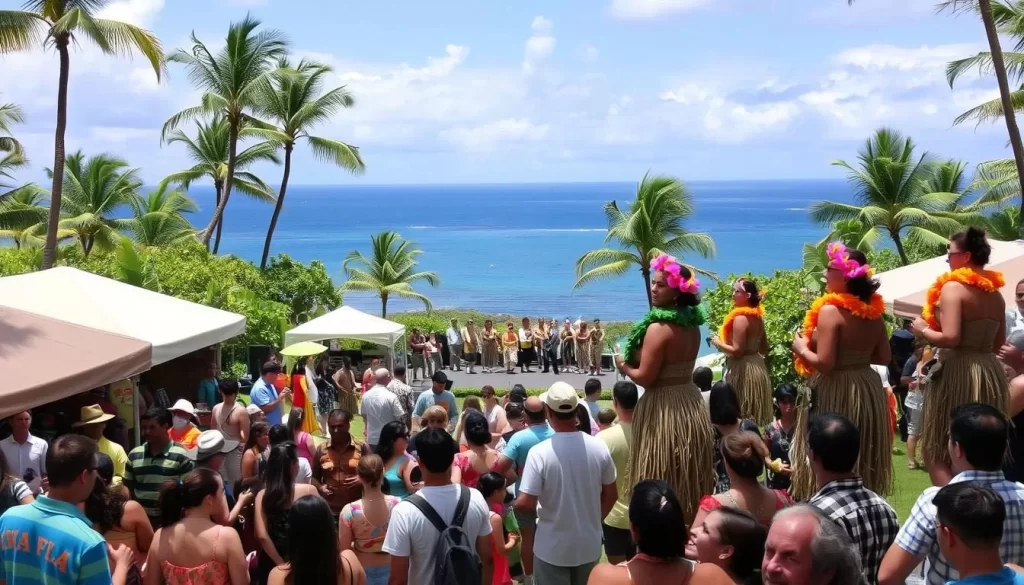
How Festivals Preserve Hawaiian Heritage
Hawaiian festivals serve as living museums, preserving the islands’ traditions, language, music, and dance. Events like the Aloha Festivals, a month-long celebration, highlight the island’s customs and bring communities together. By participating in or attending these festivals, you’ll see how they keep Hawaiian heritage alive, passing down knowledge from one generation to the next. As a local participant noted, “It’s a time to celebrate our heritage and share it with others,” encapsulating the essence of these cultural celebrations.
Best Times to Visit Hawaii for Festival Experiences
With festivals spread across the calendar, Hawaii offers something for every visitor, regardless of when they come. The island’s events are a significant part of its culture, providing a unique experience for visitors to enjoy.
Seasonal Festival Calendar
The Hawaiian islands host a variety of festivals throughout the year, each with its own unique charm. September is a great time to experience the Aloha Festivals, a month-long celebration of Hawaiian culture. In March, the Honolulu Festival brings together multicultural events that highlight the island’s rich traditions. You can expect lively parades, music performances, and local vendors showcasing their crafts. To make the most of your experience, plan ahead to secure your spot at must-see events like the floral parade or ukulele performances.
| Month | Festival/Event | Island |
|---|---|---|
| March | Honolulu Festival | Oahu |
| September | Aloha Festivals | Multiple Islands |
Weather Considerations for Festival Attendance
When planning your trip to Hawaii for a festival, it’s essential to consider the weather. The islands have varying microclimates, which can impact your experience. Summer months are generally drier, making them ideal for outdoor events. However, winter showers can occur, so it’s wise to be prepared. By understanding the weather patterns, you can make the most of your visit to the island and enjoy the opportunity to participate in Hawaii’s vibrant cultural celebrations.
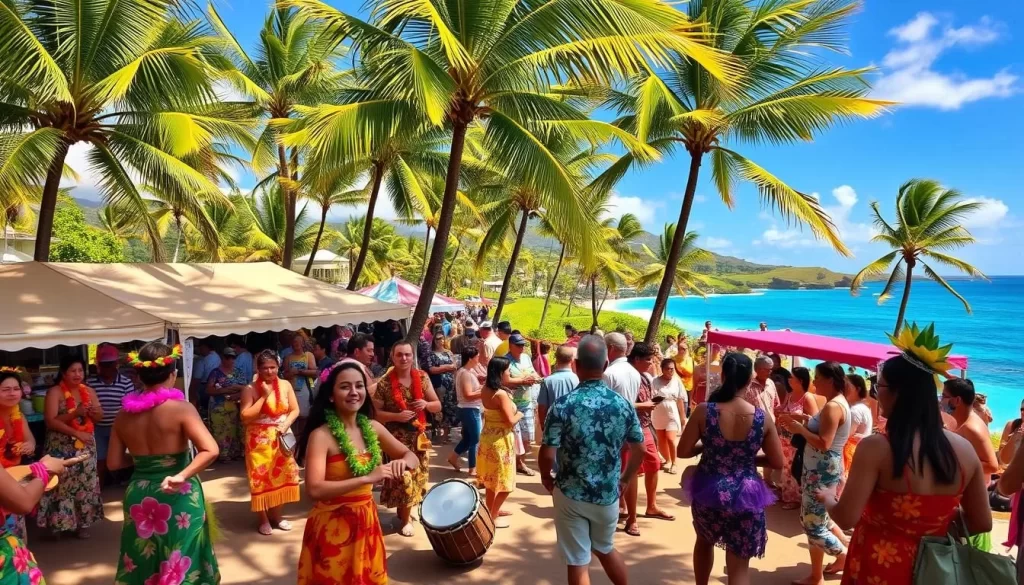
Aloha Festivals: Celebrating Hawaiian Culture
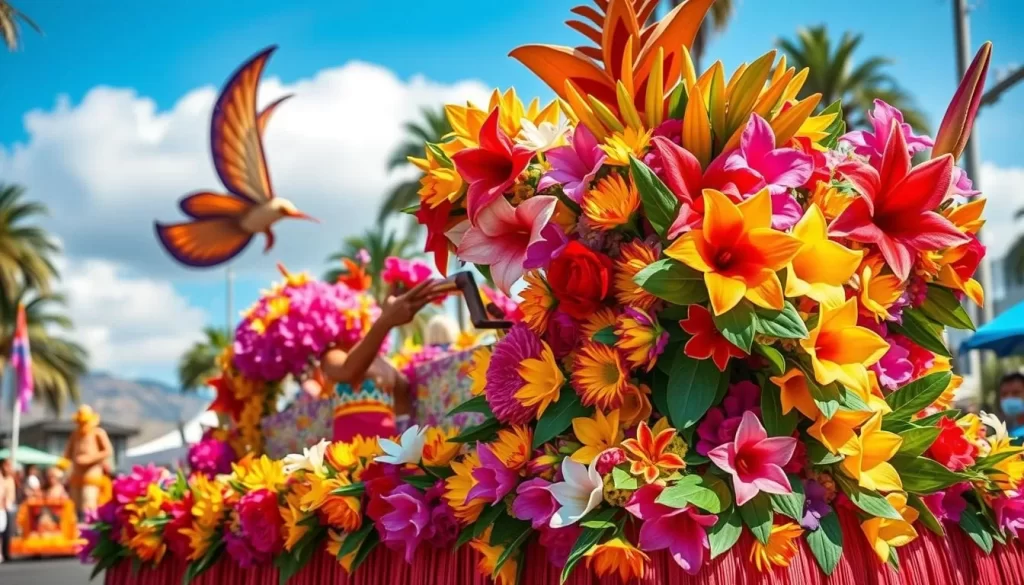
Experience the vibrant spirit of aloha at the Aloha Festivals, a month-long celebration that showcases Hawaii’s rich cultural heritage. The Aloha Festivals, held annually in September, is a spectacular event that embodies the essence of Hawaiian culture through various performances, including parades, concerts, and hula dances.
History and Significance
The Aloha Festivals have a rich history dating back to the 1940s, making it one of Hawaii’s longest-running cultural celebrations. This festival has been a cornerstone of Hawaiian culture, preserving the islands’ history and traditions. You’ll discover the significance of this event and how it brings the community together.
The festival’s history is deeply rooted in Hawaiian culture, and its significance extends beyond entertainment to promote cultural understanding and appreciation. By participating in or attending the Aloha Festivals, you’ll gain a deeper understanding of Hawaiian heritage and the importance of preserving it.
What to Expect: Parades, Music, and Performances
The Aloha Festivals offer a wide range of exciting performances and events, including the iconic floral parade, live music concerts, and traditional hula dances. The festival’s highlight is the floral parade, where beautifully decorated floats and participants dressed in traditional attire fill the streets, creating a vibrant spectacle.
Throughout the festival, you can enjoy various music performances, from traditional chants to contemporary Hawaiian music, showcasing the islands’ musical evolution. With so much to see and experience, you’ll want to plan your visit carefully to make the most of the Aloha Festivals.
Merrie Monarch Festival: The Olympics of Hula
The Merrie Monarch Festival, held annually in Hilo, is a celebration of Hawaiian culture and hula dance that draws global attention. This week-long event is a testament to the rich cultural heritage of Hawaii and its significance in preserving traditional hula dance.
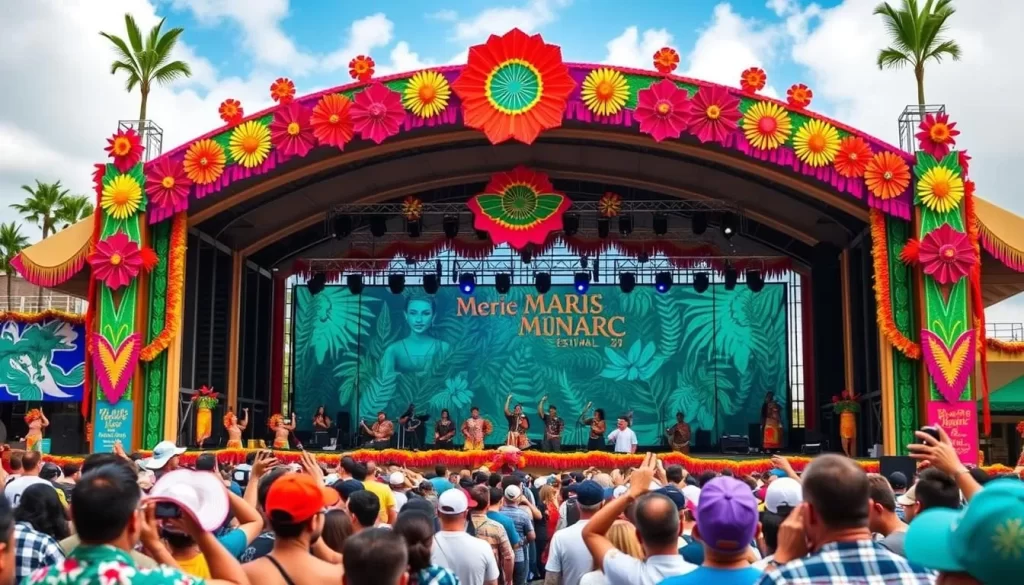
The Legacy of King David Kalākaua
King David Kalākaua played a crucial role in reviving Hawaiian culture, including hula dance, during a period when it was suppressed. His efforts to preserve and promote Hawaiian traditions have had a lasting impact on the islands. The Merrie Monarch Festival honors his legacy by continuing to celebrate and preserve hula and other Hawaiian cultural practices.
Kalākaua’s reign is often referred to as the “Golden Age” of Hawaiian culture. He was instrumental in reviving not just hula, but also other cultural practices that were fading. This revival has had a lasting impact, making hula a significant part of Hawaiian identity.
Competition Categories and Viewing Tips
The Merrie Monarch Festival features competitions in various hula categories, including hula kahiko (traditional hula) and hula ‘auana (modern hula). Understanding the differences between these categories can enhance your viewing experience. Hula kahiko is deeply rooted in ancient Hawaiian traditions, while hula ‘auana incorporates modern elements and storytelling.
To make the most of the festival, it’s advisable to plan ahead, secure tickets early, and be prepared for the unique cultural experience that awaits. The performances by skilled dancers are a highlight, showcasing the beauty and grace of hula. As one of the most prestigious hula competitions in the world, it attracts a global audience.
Lei Day: Hawaii’s Celebration of Flowers and Tradition
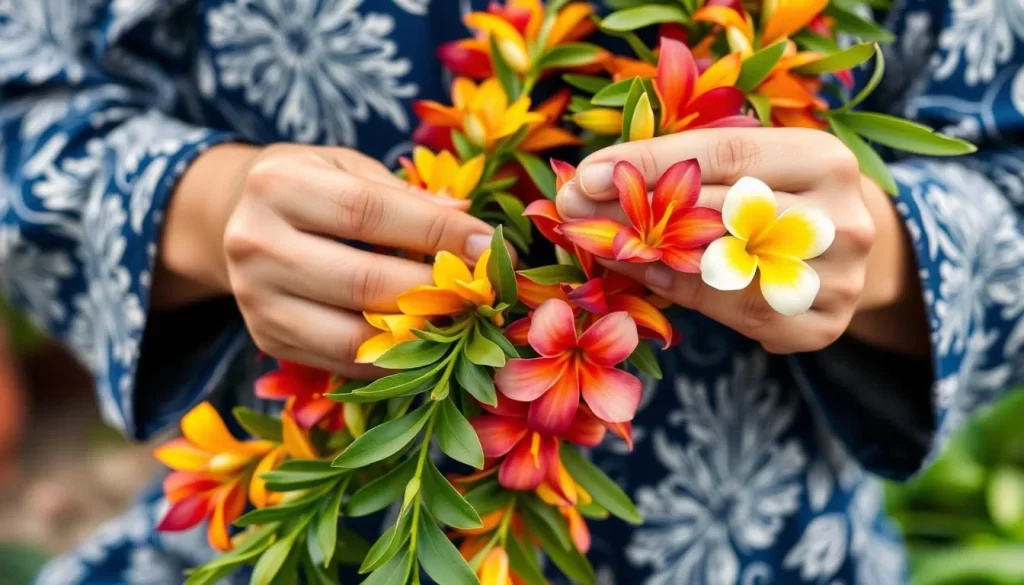
On May 1st, Hawaii comes alive with the spirit of Lei Day, a cherished tradition that showcases the islands’ rich cultural heritage. This day is marked by various festivities across the islands, including parades, music, and hula performances, all emphasizing the significance of the lei in Hawaiian culture.
The Cultural Significance of Lei Making
The art of lei making is deeply rooted in Hawaiian traditions, symbolizing love, friendship, and appreciation. Different materials and styles of leis hold various meanings, from maile vines used in ceremonial contexts to plumeria for everyday celebration. Understanding the cultural significance of lei making enhances the appreciation of this beautiful art form.
Lei Day Events Across the Islands
Lei Day events are celebrated across different islands, each adding its unique twist to the festivities. You can participate in lei-making contests, watch cultural demonstrations, and enjoy the vibrant atmosphere of this special day. Whether you’re on Oahu, Maui, or the Big Island, there’s a Lei Day event waiting for you to experience the rich heritage of Hawaii.
King Kamehameha Day: Honoring Hawaiian Royalty
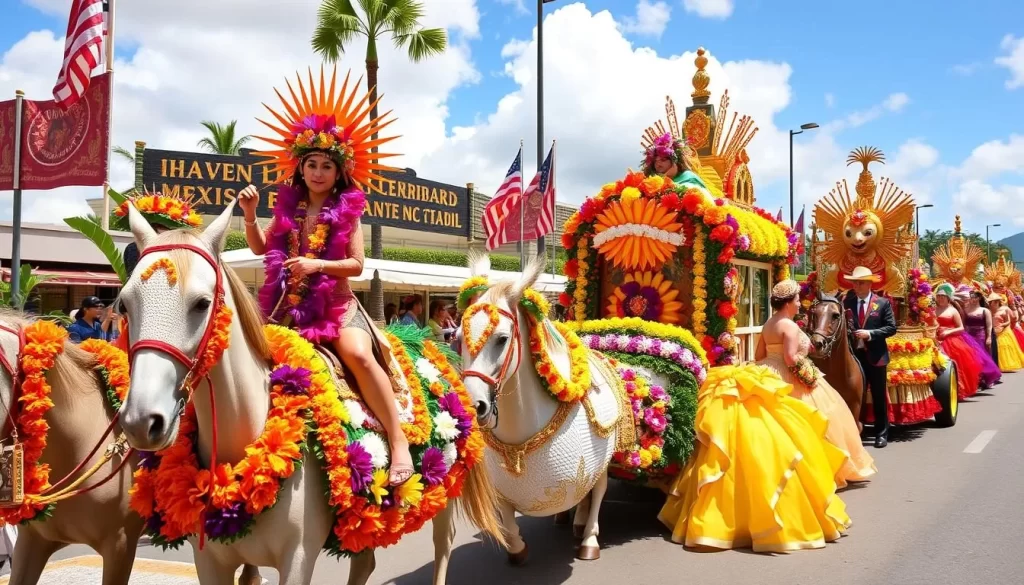
King Kamehameha Day, observed on June 11th, is a testament to the enduring legacy of Hawaii’s revered king. This day is marked by various celebrations across the islands, honoring King Kamehameha I, who unified the Hawaiian Islands in 1810.
The Historical Significance
The history of King Kamehameha Day dates back to 1871 when it was first established. It’s a day filled with events that pay tribute to the king’s contributions to Hawaiian history. The day begins with traditional ceremonies, including the draping of leis on King Kamehameha statues across the islands, symbolizing respect for the king and his impact on Hawaiian culture.
The Grand Floral Parade
One of the highlights of King Kamehameha Day is the Grand Floral Parade, known for its spectacular floats and traditions. The parade features pa’u riders adorned in colorful garments, an elaborate royal court, and beautifully decorated floats. This event is a vibrant display of Hawaiian traditions and community spirit.
As you experience King Kamehameha Day, you’ll discover the rich cultural heritage of Hawaii. The day is a celebration of the king’s unification of the islands and his lasting impact on Hawaiian identity.
Hawaii, United States: Top Festivals to Check Out When Visiting by Island
The Hawaiian islands are home to a wide range of festivals, each reflecting the distinct character and cultural emphasis of its respective island. Whether you’re a first-time visitor or a local, these gatherings offer a unique way to connect with the community and experience the island’s true essence.
Oahu’s Must-See Celebrations
Oahu, being the most populous island, hosts a variety of festivals that cater to different interests. One of the most notable events is the Honolulu Festival, a celebration of Hawaiian and international cultures through music, dance, and art. Another significant event is the Hawaii Food & Wine Festival, which showcases the island’s culinary delights and features renowned chefs from around the world.
Oahu’s festivals are not just about entertainment; they also offer a glimpse into the island’s rich cultural heritage. For instance, the King Kamehameha Celebration is a traditional pageantry that honors the island’s royal history.
| Festival | Description | Time of Year |
|---|---|---|
| Honolulu Festival | Celebration of Hawaiian and international cultures | March |
| Hawaii Food & Wine Festival | Culinary event featuring renowned chefs | October |
| King Kamehameha Celebration | Traditional pageantry honoring royal history | June |
Maui, Big Island, Kauai, and Lanai Festival Highlights
Beyond Oahu, the other Hawaiian islands offer their own unique festival experiences. On Maui, the East Maui Taro Festival celebrates the island’s agricultural heritage, while the Hawaii Steel Guitar Festival showcases this uniquely Hawaiian instrument.
The Big Island is home to the world-famous Merrie Monarch Festival, a celebration of hula dancing, and the Kona Coffee Cultural Festival, which honors the island’s coffee-growing traditions.
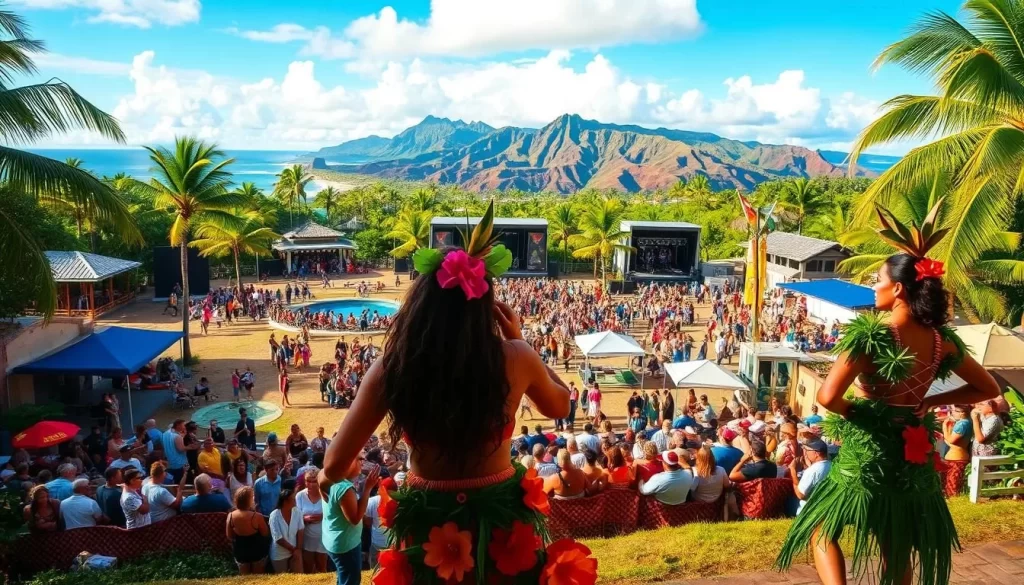
Kauai and Lanai, though less populous, host intimate and rewarding festivals. Kauai’s Eating from the Garden Festival focuses on farm-to-table cuisine, while Lanai’s events are more low-key, often centered around local harvests and community gatherings.
| Island | Festival | Description |
|---|---|---|
| Maui | East Maui Taro Festival | Celebration of agricultural heritage |
| Big Island | Merrie Monarch Festival | Celebration of hula dancing |
| Kauai | Eating from the Garden Festival | Farm-to-table cuisine celebration |
Lanai Pineapple Festival: Agricultural Heritage Celebration
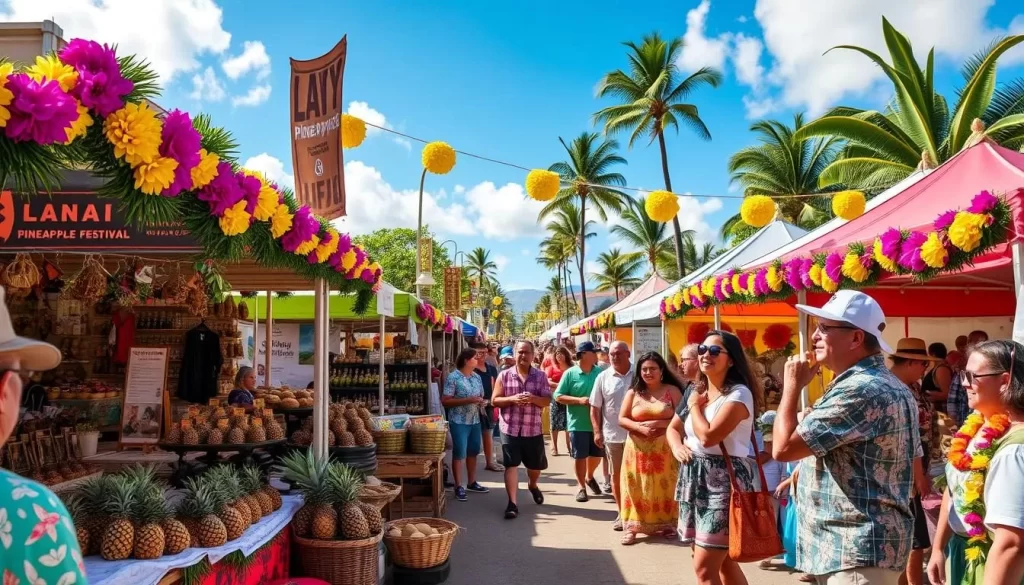
Experience the flavors and traditions of Lanai at the annual Pineapple Festival, a true island celebration. This event is a wonderful opportunity to delve into the island’s agricultural heritage, particularly its history of pineapple cultivation.
Pineapple’s Role in Hawaiian History
Lanai earned its nickname as the “Pineapple Island” when James Dole purchased it in 1922 and transformed it into the world’s largest pineapple plantation. The historical significance of pineapple cultivation to Hawaii’s economy and its impact on Lanai’s cultural landscape is profound. You can explore this rich history through exhibits and stories shared during the festival.
The pineapple industry shaped not only the economy but also the cultural identity of Lanai. It brought together people from various backgrounds, creating a unique cultural melting pot that is still celebrated today.
Interactive Food and Craft Experiences
During the Lanai Pineapple Festival, you can enjoy a variety of interactive experiences. From pineapple cooking demonstrations to craft workshops using pineapple fibers and materials, there’s something for everyone. You can sample creative pineapple dishes that go beyond the traditional fruit presentation, showcasing the versatility of pineapple in modern cuisine.
The festival also offers a chance to connect with local families who have multi-generational ties to the pineapple industry. You’ll gain authentic insights into the agricultural heritage and the stories behind Lanai’s pineapple legacy.
Ocean Arts Festival: Celebrating Marine Life and Creativity
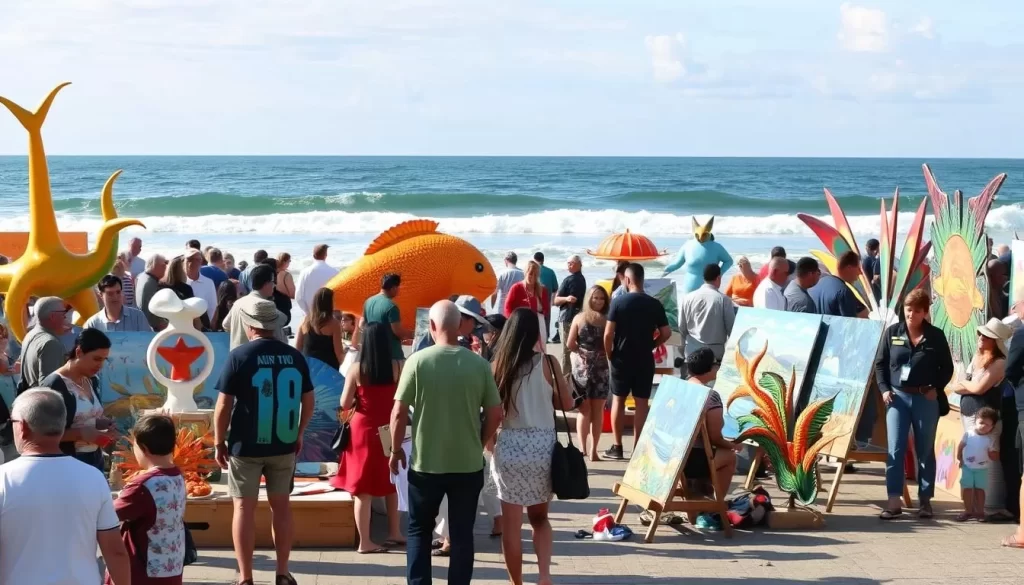
As the Ocean Arts Festival approaches, the island’s marine life and natural landscapes become the focal point of artistic expression. This unique celebration transforms Hawaii’s natural beauty into a canvas of creativity and wonder, offering an immersive experience that inspires both locals and visitors.
Marine Life Encounters Inspiring Local Art
The festival draws inspiration from the island’s marine life, particularly the annual migration of humpback whales. These gentle giants are a symbol of the ocean’s beauty and mystery. Local artists capture their essence through paintings, sculptures, and installations that reflect the harmony between land and sea. You’ll discover how Hawaii’s unique marine environment inspires artists to create works that celebrate the islands’ special relationship with the nature and the ocean.
Creative Workshops and Natural Installations
The Ocean Arts Festival brings together environmental education and artistic expression, raising awareness about marine conservation through creative mediums. You’ll learn about the various art forms featured at the festival, from traditional Hawaiian representations of sea life to contemporary installations that address issues like ocean pollution. Interactive workshops allow you to try your hand at ocean-inspired art techniques, guided by local artists who share their connection to Hawaii’s waters.
By incorporating natural materials from the shoreline into art pieces, the festival promotes sustainable works that honor rather than exploit the marine environment. This approach not only showcases the island’s events but also highlights the importance of preserving Hawaii’s natural beauty for future generations.
Film Festivals in Paradise: Cinema Under the Stars
Experience the magic of cinema in Hawaii’s breathtaking natural settings. The islands host several film festivals that showcase a diverse range of films from around the world, creating a unique cinematic experience.
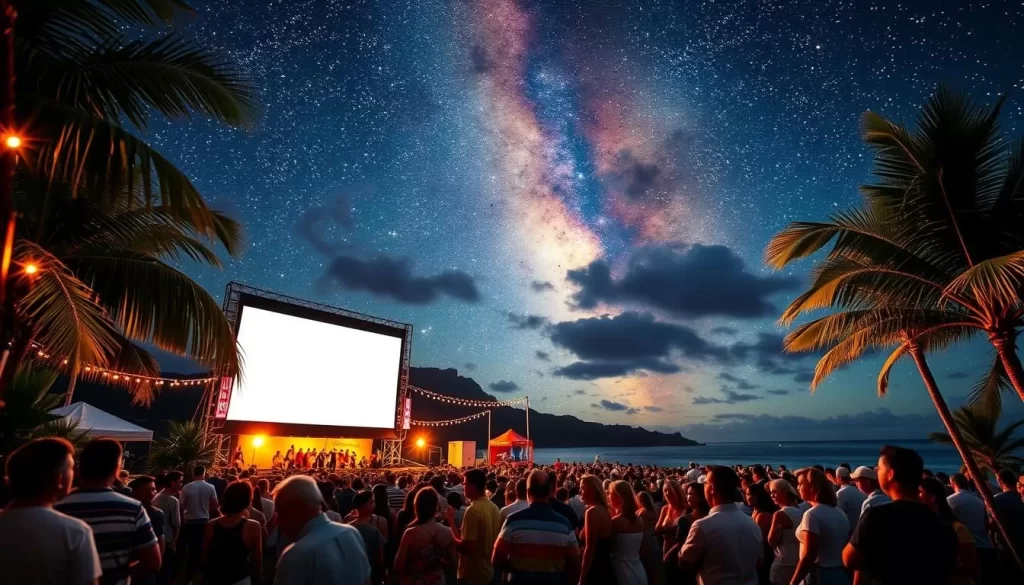
Hawaii International Film Festival
The Hawaii International Film Festival (HIFF) is a prestigious event that showcases films from around the world, with a particular focus on Asian and Pacific Islander cinema. Held annually in Honolulu, this festival attracts filmmakers, industry professionals, and film enthusiasts, making it a significant cultural experience in Hawaii.
The HIFF has been a cornerstone of Hawaiian cultural art for over 40 years, providing a place for storytelling and cultural exchange.
Maui Film Festival and Outdoor Cinema Experiences
The Maui Film Festival is a renowned event that celebrates independent cinema and showcases films from around the world. Held annually in Wailea, this festival creates a vibrant atmosphere that promotes creativity and artistic expression. The “Celestial Cinema” screenings under the stars at the Wailea Golf Course are a highlight of the festival, offering a unique experience under the night sky.
You’ll discover how Hawaii’s stunning natural settings transform into magical outdoor theaters during film festivals across the islands. Smaller film events across the islands focus on specific themes like ocean conservation, indigenous storytelling, or surf culture, adding to the rich tapestry of cinematic art in Hawaii.
Food Festivals: Tasting Hawaii’s Culinary Traditions
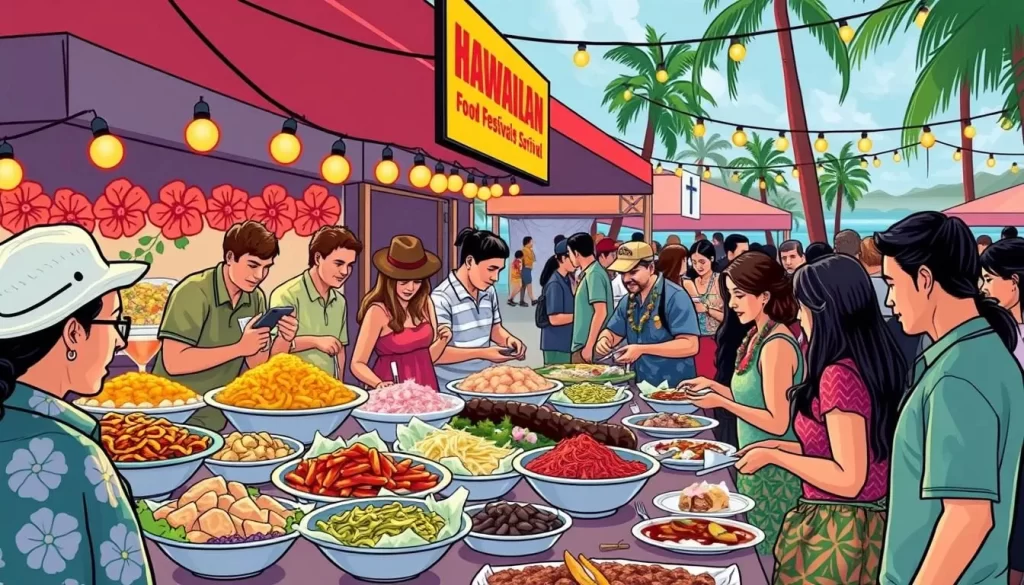
The flavors of Hawaii are on full display at its vibrant food festivals, where you can taste the islands’ rich cultural heritage. Hawaii’s unique culinary history has created a diverse food scene that is celebrated through various festivals throughout the year.
Waikiki Spam Jam: A Quirky Celebration
The Waikiki Spam Jam is a fun and quirky celebration dedicated to Spam, a beloved canned meat product in Hawaiian cuisine. Held annually in Waikiki, this event features a variety of Spam-themed dishes, live entertainment, and local vendors. You can sample a wide range of Spam creations, from traditional Hawaiian recipes to creative culinary innovations.
Hawaii Food and Wine Festival
For food enthusiasts, the Hawaii Food and Wine Festival is a must-attend event. This prestigious festival brings together international celebrity chefs with local ingredients and cooking traditions. It’s a feast for the senses, celebrating the islands’ diverse food culture and featuring a variety of delicious dishes.
Hawaii’s food festivals offer more than just eating opportunities; they’re cultural experiences that tell the story of the islands’ history through its unique cuisine. You’ll discover how Hawaii’s island heritage has influenced its culinary traditions and how these festivals keep the spirit of aloha alive.
Music Celebrations: From Traditional to Contemporary
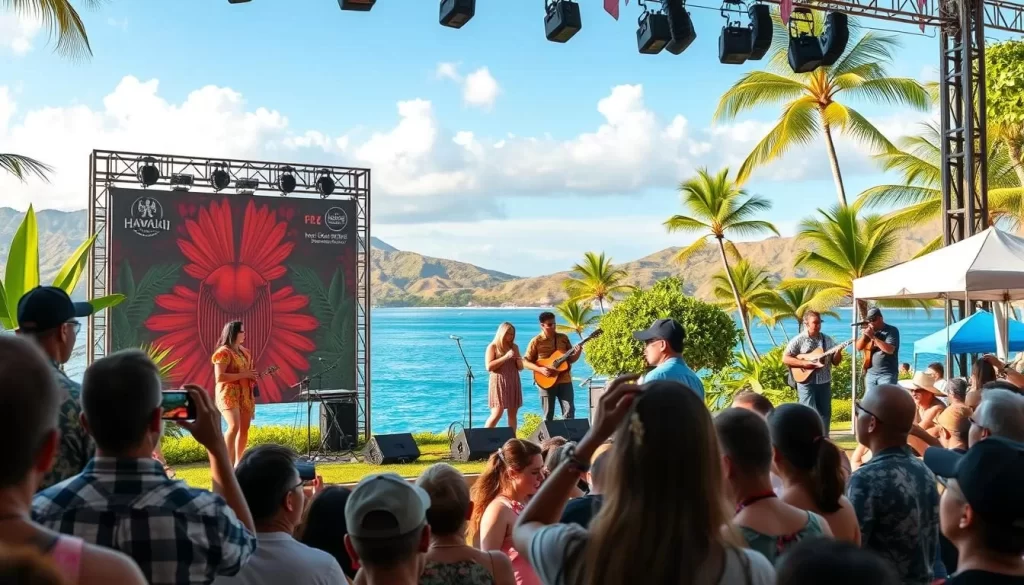
From traditional slack key guitar to modern ukulele performances, Hawaii’s music festivals offer a unique sonic experience. These events celebrate the islands’ rich musical heritage, showcasing both traditional and contemporary styles.
The Hawaiian Slack Key Guitar Festival is a celebration of the unique musical style known as slack key guitar, which originated in Hawaii. This festival brings together talented musicians from across the islands to showcase their skills and share their love for this traditional art form. Slack key guitar, or “ki ho’alu,” is a fingerstyle guitar tradition that developed in Hawaii in the early 19th century.
Hawaiian Slack Key Guitar Festival
The Hawaiian Slack Key Guitar Festival is a testament to the enduring legacy of this traditional music style. You’ll discover the history and significance of slack key guitar through performances by master musicians who preserve traditional styles, as well as innovative artists who are pushing Hawaiian music in new directions.
Ukulele Festival Hawaii
The Ukulele Festival Hawaii is the world’s largest ukulele showcase, celebrating this iconic instrument for over 50 years. The festival fills the air with melodic tunes, offering a feast for the senses. You’ll learn about the significance of the ukulele in Hawaiian music and culture, and enjoy performances by both traditional and contemporary artists.
These music festivals create opportunities for visitors to not just listen but participate through workshops, jam sessions, and hands-on instrument demonstrations. You’ll get to experience the rich musical traditions of Hawaii firsthand, making your visit a memorable one.
Cultural Immersion: Participating in Festival Workshops
By engaging in festival workshops, you can gain a deeper understanding and appreciation of Hawaiian culture and its vibrant traditions. Hawaiian festivals are not just about watching performances; they’re about actively participating in the rich cultural heritage through various interactive experiences.
Lei Making and Hula Lessons
During the festivals, attendees have the chance to participate in workshops led by experienced instructors. For instance, hula lessons provide a hands-on experience, teaching participants the basic movements and rhythms of this traditional dance. This interactive aspect fosters a greater appreciation for the art form and encourages cultural exchange.
Lei making workshops are another highlight, where you can learn the art of creating these symbolic Hawaiian garlands. From selecting the right flowers to mastering the weaving technique, you’ll gain a new skill and a deeper understanding of the cultural significance of leis in Hawaiian traditions.
Traditional Craft and Music Workshops
Beyond hula and lei making, Hawaiian festivals offer a range of workshops focused on traditional crafts and music. You can learn traditional Hawaiian crafts like lauhala weaving, kapa (bark cloth) making, and coconut leaf weaving from master practitioners. These workshops not only teach you new skills but also provide insights into the historical and cultural context of these crafts.
Music workshops, including those on traditional Hawaiian instruments, offer a unique opportunity to engage with the local music scene. You’ll learn about the significance of different instruments and how they’re used in Hawaiian cultural practices.
| Workshop Type | Description | Skill Level |
|---|---|---|
| Lei Making | Learn to create traditional Hawaiian leis | Beginner |
| Hula Lessons | Master the basic movements and rhythms of hula | All Levels |
| Lauhala Weaving | Create traditional Hawaiian weavings | Intermediate |
| Traditional Hawaiian Instruments | Learn to play traditional Hawaiian music | Beginner |
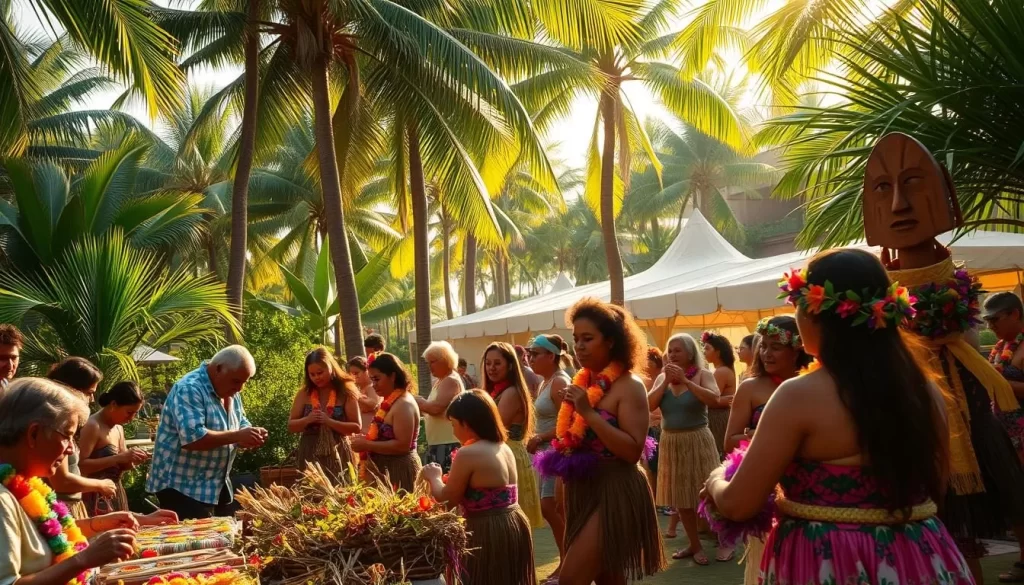
To make the most of these opportunities, it’s advisable to register for workshops in advance, as they tend to fill up quickly. By participating in these workshops, you’ll not only enhance your festival experience but also take home new skills and a deeper appreciation for Hawaiian culture.
Planning Your Festival Trip: Practical Tips
Getting ready for a Hawaiian festival requires more than just enthusiasm; it demands careful planning and preparation. With numerous festivals and events happening throughout the year, visitors need to be prepared to make the most of their experience on the island.
Accommodation and Transportation During Festival Seasons
Booking your stay early is key, especially during peak festival seasons. Hotels fill up quickly, but vacation rentals offer a more budget-friendly option. For transportation, consider renting a car or using local shuttles to navigate busy event areas. This will not only save you time but also reduce stress, allowing you to enjoy the festivals without worrying about logistics.
What to Pack for Hawaiian Festival Experiences
When attending Hawaiian festivals, it’s essential to pack wisely. Consider the time of year and the specific events you plan to attend. Comfortable clothing, sunscreen, and a hat are must-haves. Additionally, be respectful of the local culture by dressing modestly when appropriate. By being prepared, you can fully immerse yourself in the experience and enjoy the unique cultural offerings at the place you’re visiting.
To make the most of your trip, balance your festival attendance with other vacation activities. This will allow you to create an itinerary that includes both cultural immersion and relaxation, ensuring a well-rounded trip.
Respecting Hawaiian Culture at Festivals
Hawaiian festivals offer a unique opportunity to immerse yourself in the local culture, but it’s crucial to do so respectfully. These events are not just entertaining spectacles; they are deeply rooted in the islands’ history and spiritual practices. As you participate in these festivals, you’ll have the chance to experience the rich cultural heritage of Hawaii firsthand.
Cultural Etiquette for Visitors
When attending Hawaiian festivals, it’s essential to be mindful of cultural etiquette. This includes dressing modestly for ceremonial events and being respectful of sacred performances. For instance, some hula dances are considered sacred and may not be photographed; always follow the guidance of your hosts or event organizers. Understanding and respecting these cultural norms will enhance your experience and show appreciation for the local traditions.
- Be aware of and respect sacred ceremonies and performances.
- Dress modestly, especially for traditional or ceremonial events.
- Follow local guidelines on photography and participation.
Supporting Local Communities
Your attendance at Hawaiian festivals can significantly support local communities. By purchasing authentic crafts directly from artisans and enjoying food from local vendors, you’re contributing to the local economy. Embracing the concept of “malama” (to care for) by being a responsible tourist, you help preserve Hawaiian traditions and foster meaningful connections with the community.
Ways to Support Local Communities:
- Purchase authentic, locally made crafts and products.
- Enjoy local cuisine from vendors and restaurants.
- Engage respectfully with local performers and artisans.
Conclusion
Immersing yourself in Hawaii’s festivals is a great way to experience the island’s culture firsthand. These events offer a unique window into the heart of the islands, showcasing their rich heritage and community spirit.
From the historic parades to modern music and food gatherings, Hawaii’s diverse festivals cater to all interests and travel schedules. Whether you’re drawn to the Honolulu Festival or the soulful melodies of the ukulele, each festival creates unforgettable memories.
By participating in these cultural celebrations, you can transform your Hawaiian vacation into a meaningful journey of discovery. You’ll gain a deeper understanding of the island’s traditions and spirit, fostering a sense of belonging and shared joy. The experience will stay with you long after you’ve returned home, leaving a lasting impact.
With so many festivals happening throughout the year, you’re bound to find one that suits your travel plans. So, incorporate a festival into your next Hawaiian itinerary and experience the island’s vibrant culture in a way that will touch your heart and stay with you forever.
The above is subject to change.
Check back often to TRAVEL.COM for the latest travel tips and deals.
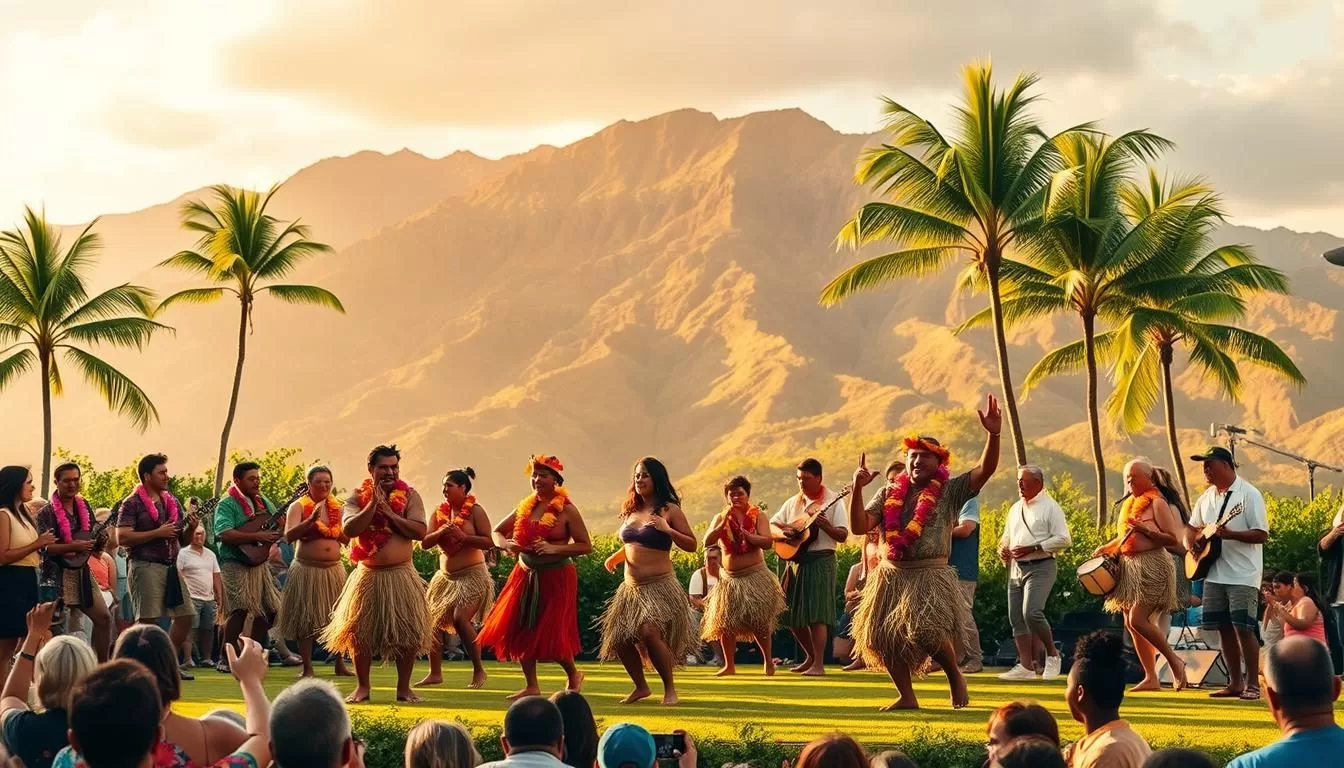



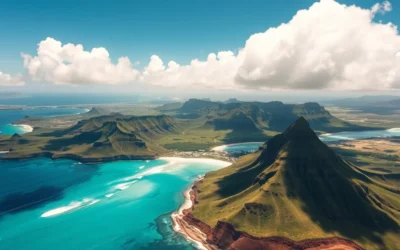
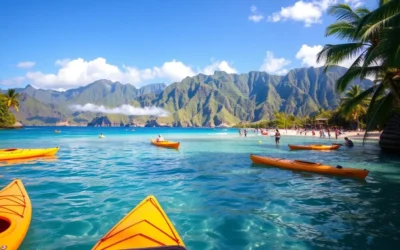
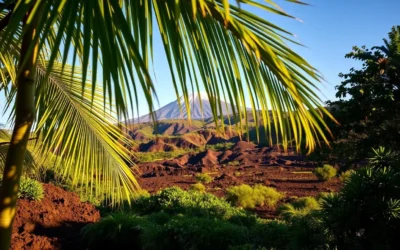
0 Comments